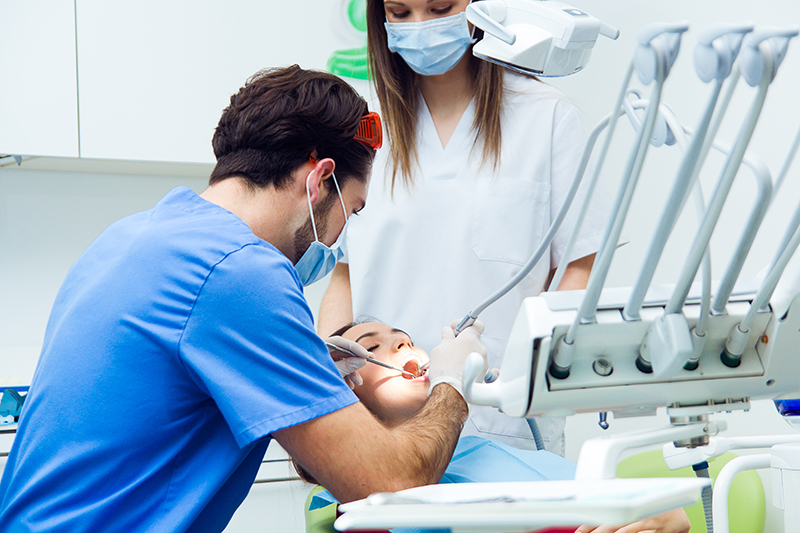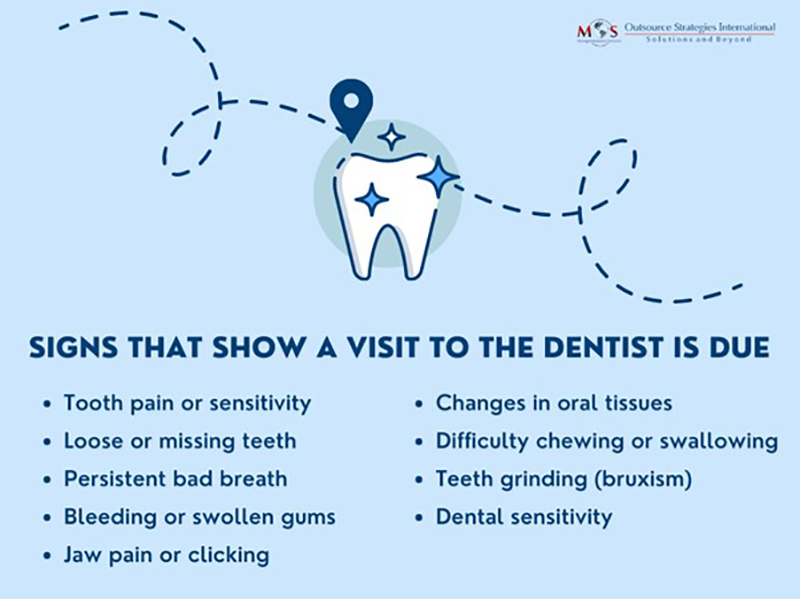Maintaining optimal oral health and preventing potential dental issues necessitate regular dental check-ups. However, there are certain warning signs that indicate to a patient that it’s time to schedule a visit to the dentist.
An experienced dental billing company in the U.S., OSI (Outsource Strategies International) helps dental practices ensure billing compliance, streamline revenue cycle management, and receive timely and optimal reimbursement. Our team is experienced in coding diverse dental conditions with the right CDT codes to ensure on-time reimbursement.
Simplify your dental billing process and focus on patient care.
Get in touch with our professional team now!
Call (800) 670 2809
Common Warning Signs It’s Time for a Dental Consultation
Let us discuss nine common warning signs that should prompt a patient to make an appointment with his/her dentist. By being aware of these signs, one can address dental issues early on and maintain a healthy smile.
Tooth Pain or Sensitivity:
Persistent tooth pain or sensitivity to hot or cold temperatures can be a sign of tooth decay, cavities, or even an underlying infection. Prolonged or recurring tooth pain is a warning sign and a dentist will be able to identify and address the underlying cause.
Bleeding or Swollen Gums:
Healthy gums should not bleed or appear swollen. Bleeding or swelling while brushing, flossing, or even during regular activities, may indicate gum disease or gingivitis. Prompt dental attention is necessary to prevent further damage to the gums, and to evaluate the overall health of the oral tissues.
Persistent Bad Breath:
While occasional bad breath is common, persistent or chronic bad breath, also known as halitosis, may be a sign of an underlying dental condition such as gum disease, cavities, or dry mouth. A dentist can assess the cause of the bad breath and provide appropriate treatment and recommendations for oral hygiene.
Loose or Missing Teeth:
Adult teeth should not feel loose or shift out of position. Any changes in tooth stability or loss of teeth due to trauma or other reasons, demand consultation with a dentist as soon as possible. Prompt intervention can help prevent further tooth loss and explore appropriate treatment options such as dental implants or dentures.
Jaw Pain or Clicking:
Chronic jaw pain, difficulty opening or closing the mouth, or clicking sounds when one chews or speaks, may be symptoms of temporomandibular joint disorder (TMJ). A dentist can help identify the underlying cause and provide appropriate treatment options to alleviate discomfort and improve jaw function.
Changes in Oral Tissues:
Regular self-examination of the oral tissues is important to detect any changes. White or red patches, sores that don’t heal within two weeks, or any unusual lumps or growths, must be evaluated by a dentist. These changes may indicate oral cancer or other serious conditions, and early detection can significantly improve treatment outcomes.
Difficulty Chewing or Swallowing:
Problems with chewing or swallowing could indicate various dental issues, including tooth decay, misaligned bite, or temporomandibular joint (TMJ) disorders. A dental examination can help identify the underlying cause and determine the appropriate treatment plan.
Teeth Grinding (Bruxism):
Excessive teeth grinding or clenching, known as bruxism, can lead to tooth damage, jaw pain, and headaches. The dentist can examine the patient’s teeth for signs of bruxism and provide good solutions such as custom mouthguards to protect the teeth.
Dental Sensitivity:
Heightened sensitivity to hot, cold, sweet, or acidic foods and beverages can indicate tooth enamel erosion, gum recession, or dental cavities. The dentist can identify the cause of sensitivity and recommend appropriate treatments or desensitizing agents.
Oral health plays a vital role in one’s overall well-being, and paying attention to warning signs is crucial for maintaining a healthy smile. Tooth pain, bleeding or swollen gums, persistent bad breath, loose or missing teeth, jaw pain or clicking, or any changes in the oral tissues should be treated with due consideration. Regular dental check-ups and addressing dental issues promptly can help prevent further complications and ensure a confident and healthy smile for years to come. Outsourced billing services is a strategic solution that empowers dental practices to focus on their core competency of providing exceptional patient care. By entrusting the billing process to experienced professionals, dental practices can also achieve efficient revenue management, and optimize their financial performance.
Unlock the potential of your dental practice with our expert dental billing services
Request a free trial now ! Talk to us at (800) 670 2809.







